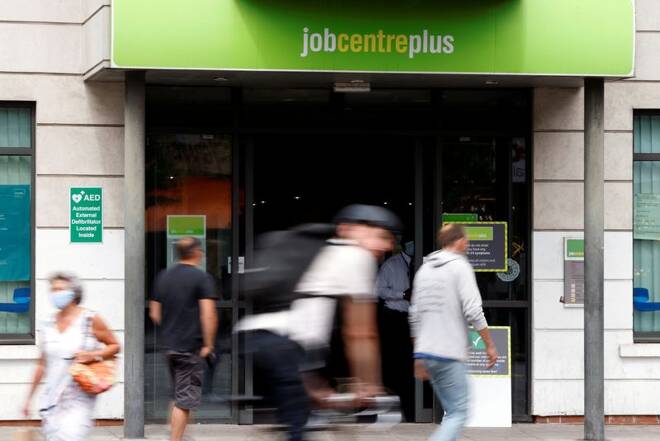Advertisement
Advertisement
UK unemployment edges up but pay growth beats forecasts
By:
(Corrects throughout as January pay growth revised up)
By David Milliken
LONDON (Reuters) -Britain’s unemployment rate rose unexpectedly in the three months to February but pay growth stayed higher than forecast, highlighting the dilemma for the Bank of England (BoE) as it judges whether to raise interest rates further.
The Office for National Statistics said the unemployment rate rose to 3.8% – its highest since the second quarter of 2022 – rather than holding at 3.7%, as forecast by economists in a Reuters poll.
Annual pay growth for the three months to January was revised up to 5.9% and held at that level for the three months to February – well above the forecast of 5.1% in the Reuters poll. Excluding bonuses, wage growth held at 6.6%.
“Pay continues to grow more slowly than prices, so earnings are still falling in real terms, although the gap between public and private sector earnings growth continues to narrow,” ONS statistician Darren Morgan said.
British consumer price inflation hit its highest in more than 40 years at 11.1% in October, and was still in double digits in February.
The BoE has forecast that inflation will fall below 4% by the end of the year as wholesale energy prices fall, but financial markets see an 80% chance that it will raise borrowing costs for a 12th meeting in a row next month to 4.5% from 4.25%.
Wage pressures are a key concern for the central bank, and while the unexpectedly fast pay growth will be a concern, it may draw some comfort from some signs in Tuesday’s data that the inflationary heat in the labour market is easing.
Britain’s economic inactivity rate fell by 0.4 percentage points from the previous quarter to 21.1% – its lowest since the three months to May 2022 – while the number of job vacancies dropped by 47,000 to 1.105 million, the lowest since the three months to August 2021, although still 304,000 higher than before the pandemic.
“Though optimism has been rising that the UK economy will avoid recession this year, we continue to see the labour market coming off the boil,” said Jack Kennedy, an economist at recruitment website Indeed.
As well as lower vacancies in the ONS data, data from Indeed showed that businesses were now less willing to offer signing bonuses to staff than late last year, he added.
(Additional reporting by Sachin Ravikumar, Editing by William Schomberg)
About the Author
Reuterscontributor
Reuters, the news and media division of Thomson Reuters, is the world’s largest international multimedia news provider reaching more than one billion people every day. Reuters provides trusted business, financial, national, and international news to professionals via Thomson Reuters desktops, the world's media organizations, and directly to consumers at Reuters.com and via Reuters TV. Learn more about Thomson Reuters products:
Advertisement
